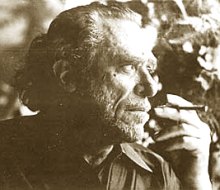
Back Charles Bukowski Afrikaans Charles Bukowski AN تشارلز بوكوفسكي Arabic تشارلز بوكوفسكى ARZ Charles Bukowski AST Çarlz Bukovski Azerbaijani چارلز بوکووسکی AZB Чарлз Букоўскі Byelorussian Чарлз Букоўскі BE-X-OLD Чарлс Буковски Bulgarian
Charles Bukowski | |
|---|---|
 | |
| Born | Heinrich Karl Bukowski August 16, 1920 Andernach, Prussia, Germany |
| Died | March 9, 1994 (aged 73) Los Angeles, California, U.S. |
| Nationality | German
American |
| Occupations |
|
| Movement | Dirty realism,[1][2] transgressive fiction[3] |
| Spouses | Barbara Frye
(m. 1957; div. 1959)Linda Lee Beighle (m. 1985) |
| Children | 1 |
Henry Charles Bukowski (/buːˈkaʊski/ boo-KOW-skee; born Heinrich Karl Bukowski, German: [ˈhaɪnʁɪç ˈkaʁl buˈkɔfski]; August 16, 1920 – March 9, 1994) was a German-American poet, novelist, and short story writer. His writing was influenced by the social, cultural, and economic ambience of his adopted home city of Los Angeles.[4] Bukowski's work addresses the ordinary lives of poor Americans, the act of writing, alcohol, relationships with women, and the drudgery of work. The FBI kept a file on him as a result of his column Notes of a Dirty Old Man in the LA underground newspaper Open City.[5][6]
Bukowski published extensively in small literary magazines and with small presses beginning in the early 1940s and continuing on through the early 1990s. He wrote thousands of poems, hundreds of short stories and six novels, eventually publishing over sixty books during the course of his career. Some of these works include his Poems Written Before Jumping Out of an 8 Story Window, published by his friend and fellow poet Charles Potts, and better-known works such as Burning in Water, Drowning in Flame. These poems and stories were later republished by John Martin's Black Sparrow Press (now HarperCollins/Ecco Press) as collected volumes of his work. As noted by one reviewer, "Bukowski continued to be, thanks to his antics and deliberate clownish performances, the king of the underground and the epitome of the littles in the ensuing decades, stressing his loyalty to those small press editors who had first championed his work and consolidating his presence in new ventures such as the New York Quarterly, Chiron Review, or Slipstream."[7]
In 1986, Time called Bukowski a "laureate of American lowlife".[8] Regarding his enduring popular appeal, Adam Kirsch of The New Yorker wrote, "the secret of Bukowski's appeal ... [is that] he combines the confessional poet's promise of intimacy with the larger-than-life aplomb of a pulp-fiction hero."[9]
During his lifetime, Bukowski received little attention from academic critics in the United States, but was better received in Europe, particularly the UK, and especially Germany, where he was born. Since his death in March 1994, Bukowski has been the subject of a number of critical articles and books about both his life and writings.
- ^ Dobozy, Tamas (2001). "In the Country of Contradiction the Hypocrite is King: Defining Dirty Realism in Charles Bukowski's Factotum". Modern Fiction Studies. 47: 43–68. doi:10.1353/mfs.2001.0002. S2CID 170828985.
- ^ "Charles Bukowski (criticism)". Enotes.com. Retrieved July 17, 2014.
- ^ Donnelly, Ben. "The Review of Contemporary Fiction: Charles Bukowski: Locked in the Arms of a Crazy Life by Howard Sounces". Dalkey Archive Press at the University of Illinois. Archived from the original on October 11, 2008.
- ^ "Bukowski, Charles". Columbia University Press.
- ^ "Charles Bukowski FBI files". bukowski.net.
- ^ Keeler, Emily (September 9, 2013). "The FBI kept its own notes on 'dirty old man' Charles Bukowski". Los Angeles Times.
- ^ "Charles Bukowski, King of the Underground From Obscurity to Literary Icon". Palgrave Macmillan. Archived from the original on September 24, 2015. Retrieved April 2, 2015.
- ^ Iyer, Pico (June 16, 1986). "Celebrities Who Travel Well". Time. Archived from the original on March 16, 2008. Retrieved April 28, 2010.
- ^ Kirsch, Adam (March 14, 2005). "Smashed". The New Yorker.